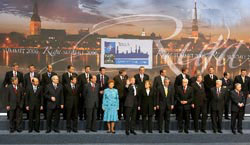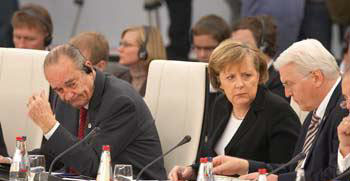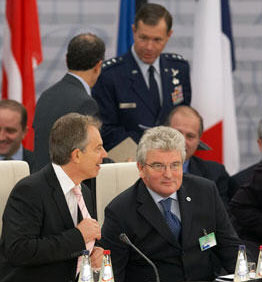| Tools: Save | Print | E-mail | Most Read |
| NATO Summit Addresses Major Issues |
| Adjust font size: |
"We reaffirm that NATO remains open to new European members under Article 10 of the North Atlantic Treaty," said the NATO leaders in a declaration issued at the end of the alliance's Riga Summit on Wednesday.
However, emphasis was placed on actual accession being strictly performance-based. "At our next summit in 2008, the alliance intends to extend further invitations to those countries who meet NATO's performance-based standards and are able to contribute to Euro-Atlantic security and stability," said the declaration. NATO's ongoing enlargement process has been a historic success in ensuring stability, peace and cooperation in Europe and the vision of a Europe, which is whole, free, and at peace, it said. The leaders welcomed the efforts of Albania, Croatia, and Macedonia to prepare themselves for the responsibilities and obligations of membership. The three Balkan states are recognized by NATO as formal aspirant countries. The alliance also invited three other Balkan states -- Bosnia, Montenegro and Serbia -- to join the Partnership for Peace (PfP) program and the Euro-Atlantic Partnership Council, the two mechanisms through which the alliance fosters relations with non-NATO countries in the Euro-Atlantic area. The PfP, launched in 1994, is a program of practical bilateral cooperation between individual partner countries and NATO. It allows nations to build up an individual relationship with NATO, choosing their own priorities for cooperation. A total of 20 countries have joined the program. "We firmly believe that Bosnia and Herzegovina, Montenegro and Serbia can offer valuable contributions to regional stability and security. We strongly support the ongoing reform processes and want to encourage further positive developments in the region on its path toward Euro-Atlantic integration," said the declaration. The leaders also reaffirmed NATO's willingness to continue the Intensified Dialogues with Georgia and Ukraine "without prejudice to any eventual alliance decision."
Meanwhile, they declared that NATO's rapid reaction force, the NATO Response Force (NRF), is now at full operational capability. "It (NRF) plays a vital part in the alliance's response to a rapidly emerging crisis. It also serves as a catalyst for transformation and inter-operability and will enhance the overall quality of our armed purposes," said the declaration. With full capability, the 25,000-strong NRF can be dispatched to any part of the globe within 5 days for a variety of operations, such as evacuations, disaster management and counter-terrorism. Besides the declaration, the leaders also endorsed a key policy document, defining terrorism and the spread of weapons of mass destruction (WMD) as the probable principal threats to the alliance in the next 10 to 15 years.
The Comprehensive Political Guidance provides a framework and political direction for NATO's transformation and highlights the priorities for the enhancement of the alliance's military capabilities over the next 10 to 15 years. It said the security environment continues to change. "It is and will be complex and global, and subject to unforeseeable developments." "Terrorism, increasingly global in scope and lethal in results, and the spread of weapons of mass destruction are likely to be the principal threats to the alliance over the next 10 to 15 years," it said. Other threats listed in the document include instability among failed or failing states, regional crises and conflicts; the growing availability of sophisticated conventional weaponry; misuse of emerging technologies; and the disruption of the flow of vital resources. At a press conference, NATO Secretary-General Jaap de Hoop Scheffer revealed that NATO had agreed to consider creating a contact group on Afghanistan as proposed by French President Jacques Chirac. "I, the secretary general of NATO, has been tasked to think about and put forward proposals for the possibility of a contact group for Afghanistan," de Hoop Scheffer said. He said the contact group would concern not only NATO, but all other international organizations active in Afghanistan. (Xinhua News Agency November 30, 2006) |
| Tools: Save | Print | E-mail | Most Read |
 |
| Related Stories |
|
Product Directory China Search |
Country Search Hot Buys |


